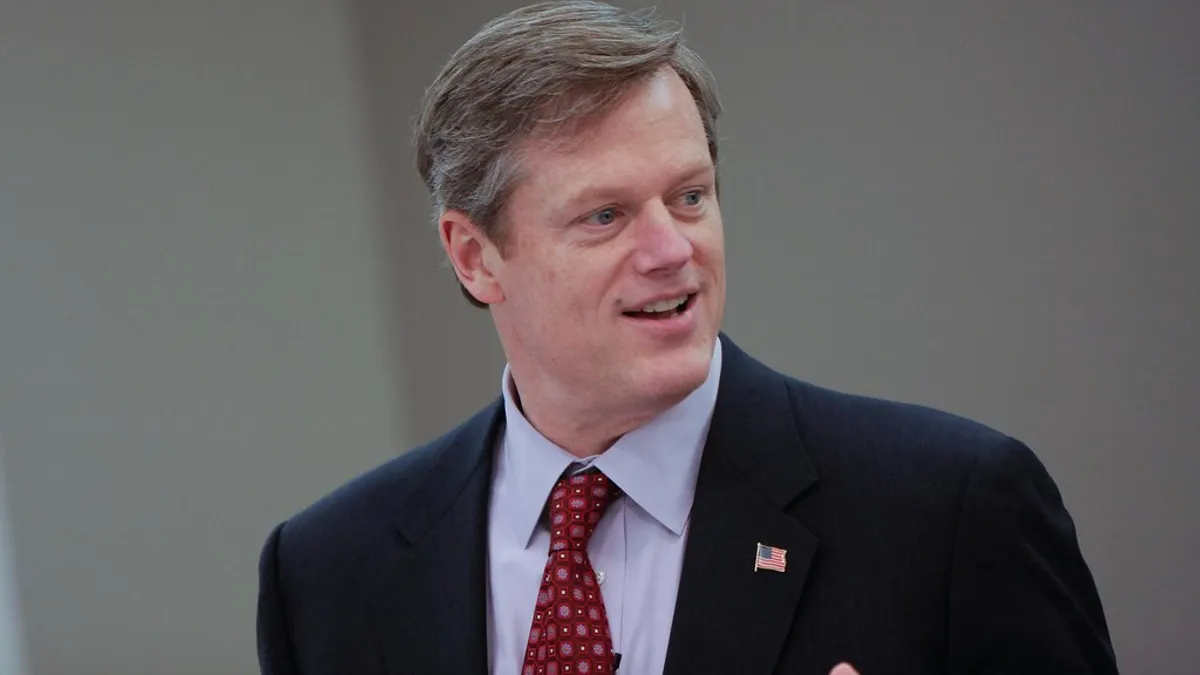Dive Brief:
-
Massachusetts Gov. Charlie Baker, R, on Tuesday announced he wants the state to adopt a goal of net-zero greenhouse gas emissions by 2050 — a target also included in comprehensive legislation expected to be introduced in the Massachusetts legislature on Thursday.
-
The goal would be a jump from the state's 2008 Global Warming Solutions Act, which set targets of 10% to 25% emissions reductions below 1990 levels by 2020 and 80% below 1990 levels by 2050.
-
Baker's announcement comes about a month after Washington Gov. Jay Inslee, D, introduced legislation to adopt a similar goal of net-zero emissions by 2050 for his state.
Dive Insight:
In his 2020 State of the Commonwealth Address, Gov. Baker said that previously announced offshore wind projects awaiting federal approval and a recent deal to buy hydroelectric energy from Quebec will help Massachusetts reduce its greenhouse gas emissions, but the state must not stop there.
"Yesterday's solutions and yesterday's plans are no longer sufficient. We must continue to take bold action to reduce our greenhouse gas emissions," Baker said. "Tonight, I'm committing the Commonwealth to achieving an ambitious climate goal: net-zero greenhouse gas emissions by 2050."
Brad Campbell, president of the New England environmental group Conservation Law Foundation (CLF), praised the goal. "Governor Baker's crucial directive puts Massachusetts in the vanguard of states and nations combating climate change and embracing a clean energy future," Campbell said in a statement. "We look forward to working with the administration on the bold steps that need to follow."
A 2018 progress report showed that Massachusetts will likely reach and surpass the 25% targeted reduction by 2020 under the 2008 law, but a delay in final calculations means that the exact level of emissions will not be known until 2022, a CLF spokesperson told Utility Dive.
The governor emphasized the state's participation in the proposed regional Transportation Climate Initiative (TCI) as particularly important toward meeting this new goal.
"Greenhouse gas emissions from transportation have been on the rise for decades and now represent 40% of this state's total emissions. Unless we take on transportation, we won't meet our objectives," he said.
TCI would create a cap on gasoline and diesel emissions, and auction off pollution allowances. The proceeds from those auctions would then be invested into low-emissions transportation options like public transit and electric vehicles.
"I get that this is going to be hard," Baker said of TCI. State lawmakers have criticized the initiative as essentially a gas tax, and want to block the governor from entering into TCI without approval from the legislature.
Massachusetts House Speaker Robert DeLeo, D, said the house will also have its own bill similar to the Senate version, and that he hopes to get the legislation passed by the end of July, MassLive reported.














